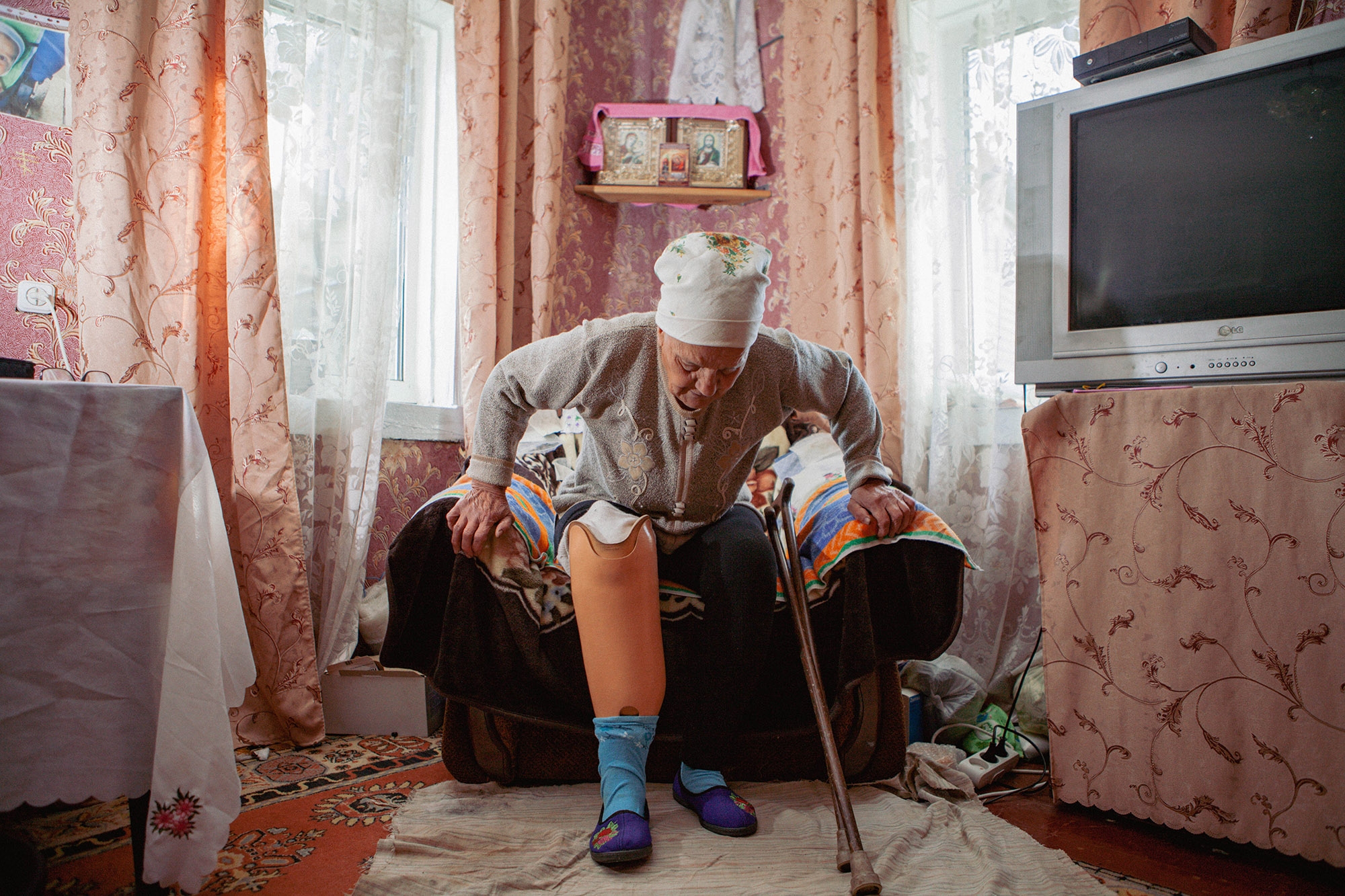
Liubov is dancing again
As thousands of people, on foot and in cars, wade through the muddy field outside the village, trying to make their way to the one road leading out of besieged Chernihiv, a Russian bomb falls and injures Liubov’s leg.
In her youth, Liubov Myronivna loved to dance. To the tambourine and accordion. In the evenings, at village get-togethers when this tradition was still alive. All kinds of dances: polka, little apple dance, krakowiak, hopak: «I won’t marry a Pole because I don’t know how to dance the krakowiak», a saying went. She danced into the night — fast, dashing, light on her feet.
It was half a century ago when the village musicians and singers were still around, still meeting regularly, and had not yet stored away their instruments in the wooden chests eaten by woodworms.
Liubov Myronivna did not like singing — she did not know how to do it. Others always did it. And she went dancing. And so she danced until she was almost seventy — until her son’s death. After that, she had no desire to dance, to laugh, to enjoy herself. She became a woman who lost her child and had a hard time dealing with it.
Half a century later, an Austrian doctor asked her through a translation app on his phone, «Are you sure you have nothing more to say to me?» Liubov Myronivna burst out laughing. She wanted to, but she did not speak German. So she said it in her own dialect.
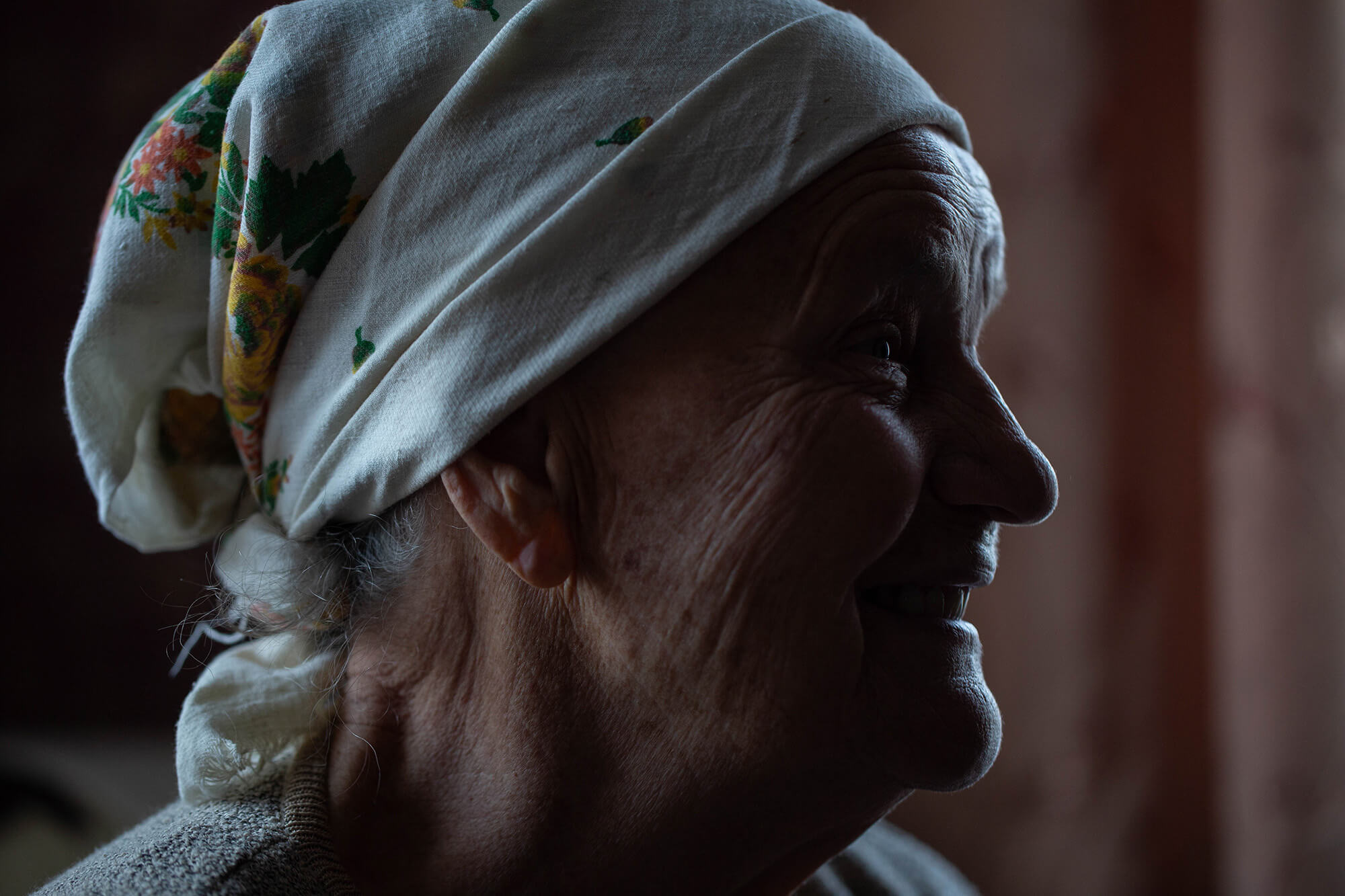
«I’ll dance for you if you make me well.» And she waved her hands to show how she would do it.
The Austrian doctor laughed. Perhaps because the woman, already in her seventies with an amputated leg, was in a good mood, while so many young people also affected by war could not get over it. The doctor understood her even without his translation app. He gave her a thumbs up — this was how they usually communicated when no one was there to translate. Thumbs up meant great, thumbs down — not really. Liubov answered with the same gesture.
Anysiv: then and now
In March 2022, from the hilly streets of Anysiv, a village in Ivanivska municipality, one could see the golden domes of the churches in Chernihiv, a dark field, lines of cars, and black smoke rising above the city. For two weeks, Russian soldiers had been trying to take Chernihiv on their way to the capital.
Chernihiv is less than ten kilometers from the village across the field. The last narrow road to escape or to bring food and medicine into Chernihiv leads through the barren field under fire through Anysiv. From Anysiv, passing the occupied territories on both sides, people can get to Kyiv and then go their own way.
In March, the field froze, then drowned in thick mud, distant gunfire and loud explosions echoed. Dozens of people did not make it. Almost every village in Ivanivska municipality, except for a few, were occupied. Anysiv was one of the last villages the Russian troops had to occupy to reach their destination.
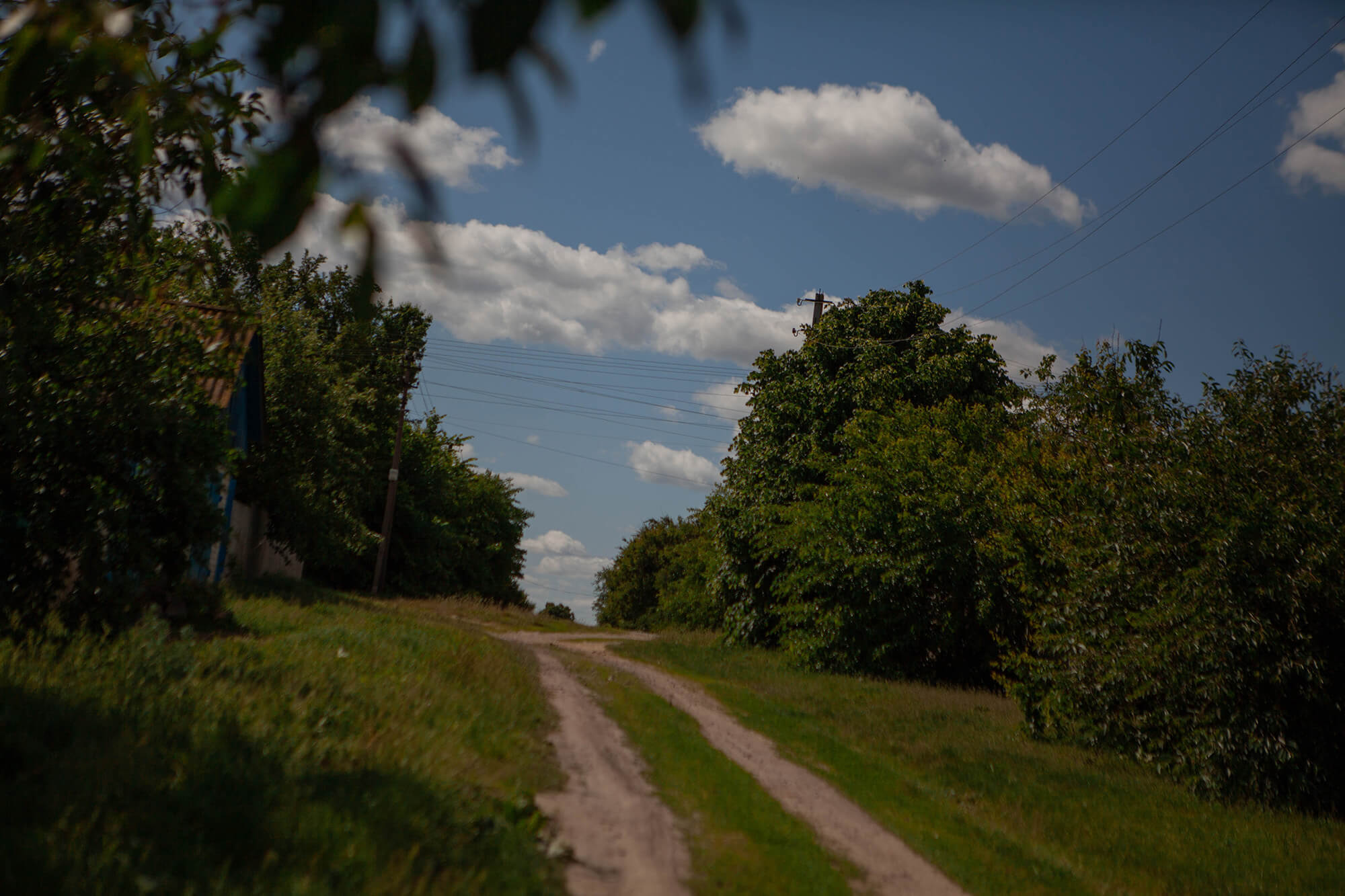

Before the full-scale war, more than a thousand people lived in Anysiv. Long winding streets, a sprawling village center — if the Desna River did not separate the village from Chernihiv, it would have become its suburb. People often move from remote villages to regional centers, but there is no migration here — the city is only a fifteen-minute drive away. Since there are few jobs in Anysiv, young people commute to Chernihiv every day.
Yuriy Stelmakh is a local entrepreneur who owns a farm that raises cattle, produces milk, and stores grain. Yuriy has devoted the last twenty years of his life to this farm. He has also created jobs — though not for all the locals.
The Russians dropped bombs on his farm on March 21,2022, ten days before their retreat. About eighty calves and forty cows — half of the livestock — died in the fire. A garage with the equipment, a laboratory, a dairy station, tractors, and some of the grain and oats for the cattle were also burned down.
During active hostilities, people could get free milk and meat at the farmand use electrical generators to charge their phones. There were also people at the farm on March 21st. Some of them, like Liubov Prochukhan, 70, came to help milk the cows. The bombs fell near the place where they were taking the milk. Several villagers were wounded, and one person died.
At first, Yuriy Stelmakh had no idea how to rebuild the farm: his fields were mined, some of the equipment and supplies were burned. But slowly, he started everything all over again. Seeders followed the gentle movements of the deminers. Volodymyr Ihnatenko, the head of Anysiv, says the farm is up and running again, albeit at partial capacity.

During the hostilities, crowds of people passed through the village. Volodymyr remembers that from the tops of the hills, they could see them coming from far away. In Anysiv, the local men organized themselves and welcomed the arrivals. They took some of the people further away to safe towns and helped others to get to the bus. No one asked them to do this — people simply knew that their village was the only rescue route from Chernihiv. If someone wanted to stay in the village, they provided shelter, food, and other necessities.
Of all the municipalities in the Chernihiv region, Ivanivska municipality has probably suffered the most. In occupied Ivanivka, dozens of houses burned down. In neighboring Yahidne, the Russians kept more than three hundred people in the cramped underground cellars, using them as human shields. In the first days of April, these villagers needed everything: food, toothpaste, clothes. A year after the occupation, these same villagers would bring donations for the people in the east and south of Ukraine — in the liberated Kharkiv region and the de-occupied Kherson.
Anysiv is recovering. One of the biggest achievements was the repair of the school bomb shelter. Thanks to this, children were able to go to school safely again. And they not only repaired the shelter but, with the help of donations, built an entire educational center where children can gather, learn, and play whenever they want without fear of shelling.
Liubov should be here somewhere
I remember the shadow of smoke over the city and the dark domes of the monastery, which I saw from the village’s hilly main road in mid-March when I was on my way from Chernihiv. We, too, crossed the field — quickly, without stopping — and had no idea where to go next when we found ourselves in the tangled streets of Anysiv. My heart was pounding, the children were nervous, something swooshed nearby, and I found it hard to focus, thinking about the people who had not made it to the village just a few days ago.
We stopped next to an old man getting water from the well. I rolled down the window and was about to get out of the car when he quietly pointed to the right without even looking at me. All these strangers were here, searching for the right way that would take them away from the Russians. The old man kept turning the old, damp crank of the well accompanied by the dull, distant sounds of explosions. The chains creaked as they wrapped around the crank.
At that moment, Liubov Myronivna was most likely at home. Maybe she was cutting branches to make firewood or making cheese. She had not fled. Her older son had left with his family, but she had no desire to go. Her daughter lived in Russia and did not believe what her mother told her.
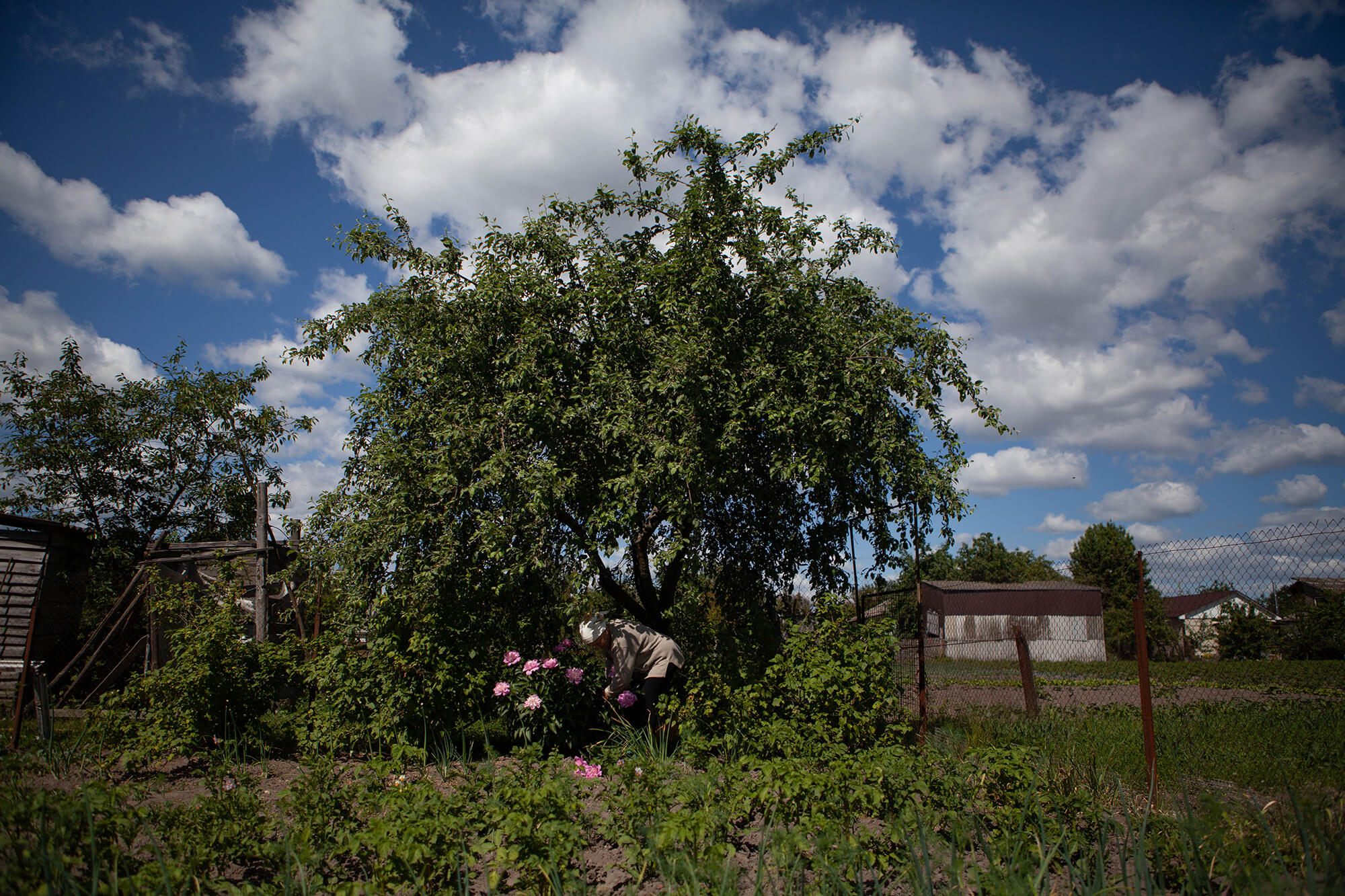
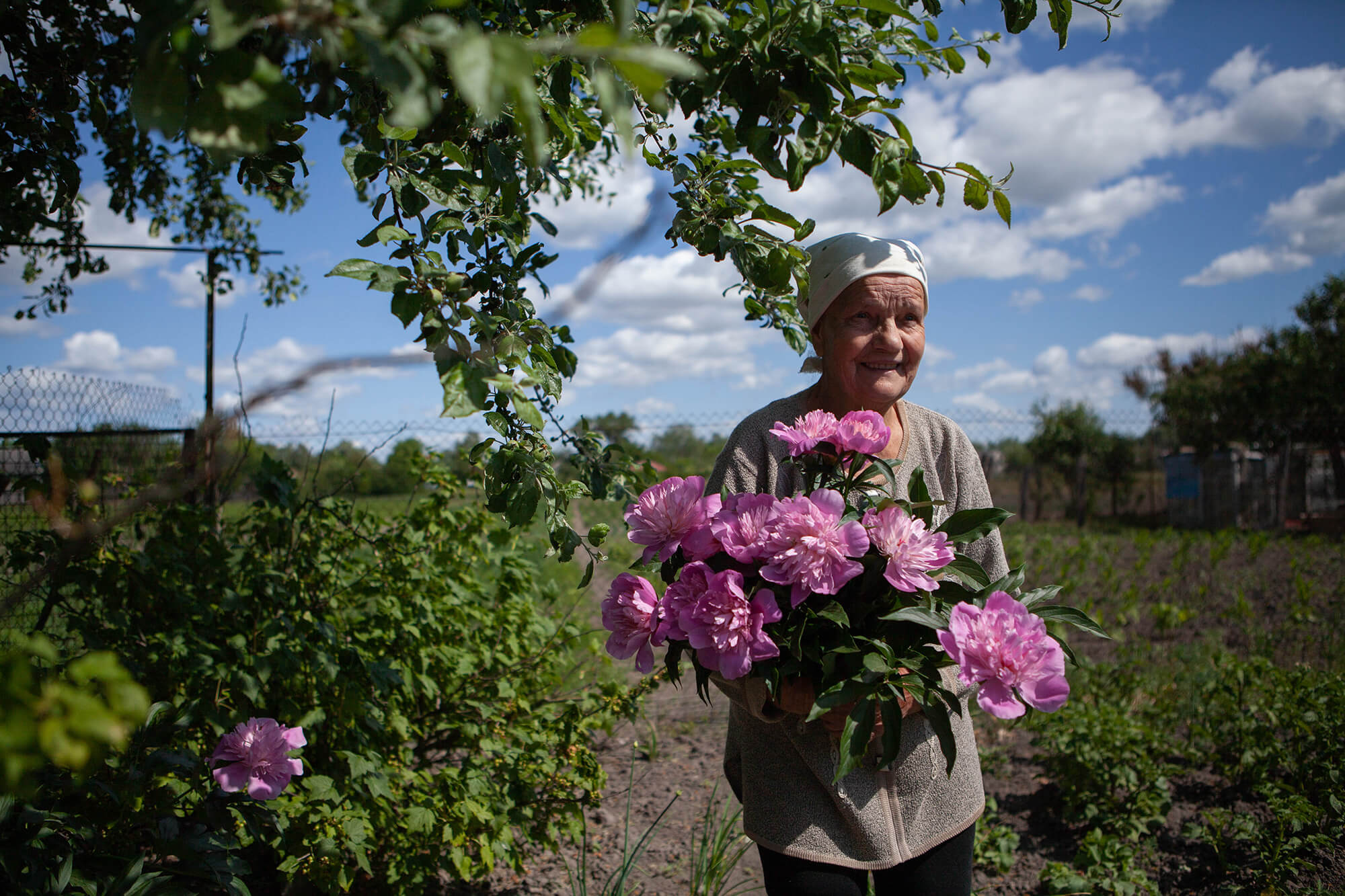
Instead, Liubov felt like feeding her chickens and grieving — her birthday had just passed, and the anniversary of her son’s death was fast approaching. As I was passing by, one of the women in white headscarves staring out the windows could have been her.
Not all smooth sailing
In her 74th year of life, Liubov Myronivna allowed herself to rely on the invisible thread of fate. She was not yet in deep old age, but the hard work in the village made her look older.
She asked not to ignore her offer of help, even if she was an old woman. She would get on her bicycle and ride to the farm, where they gave away milk. Sometimes she would bring back as much as twenty liters at a time. Together with Kolia’s mother, whose son was a local volunteer, she made fragrant cheese, which Kolia later took to the Ukrainian soldiers.
That war-torn March, Liubov pulled men’s shoes, sweaters, sneakers, jackets, and socks out of her closet to donate to the military. These garments had laid there for the past two years. She did not touch them because they belonged to Zhenia, her younger son, who died right in her backyard on a spring day like this. He was only 36 years old. Late one night, he went out on the porch to smoke a cigarette and never returned. He laid breathless as his mother stepped over the threshold. No sounds, no warning signs. One moment, he was alive — and the next, he was gone.
Liubov’s birthday is on March 9. Last March, when her son was still alive, she celebrated it by singing and dancing late into the night. She danced and laughed so much and became so emotional that she could not fall asleep. She knows: out of great joys come even greater tears. Two weeks later, she buried her son and never wanted to celebrate, dance, and enjoy herself ever again.
So this year, on her birthday, she packed some meat, milk, cheese, bread, and sugar, hung the bundle on her bicycle’s handlebars, and took it to her friend’s sister, whose family was barely making ends meet. She knocked on the door, gave them the food, and said: «This is for you. Please celebrate my birthday!».
As soon as she left their house and returned home, the shelling began on their street and outside the village.
The next morning, dozens of people decided to try to leave Chernihiv on foot. Others had already done so many times.
People, most of them young, waded through the muddy field. The day before, cars were not allowed to leave Chernihiv because hostilities had started along the road. But it was possible to walk across the field. Soon the field was the only way out of the city, and cars were also allowed there. That was until the Russians dropped a bomb on the last remaining bridge over the Desna River, crippling the already complicated evacuation efforts.
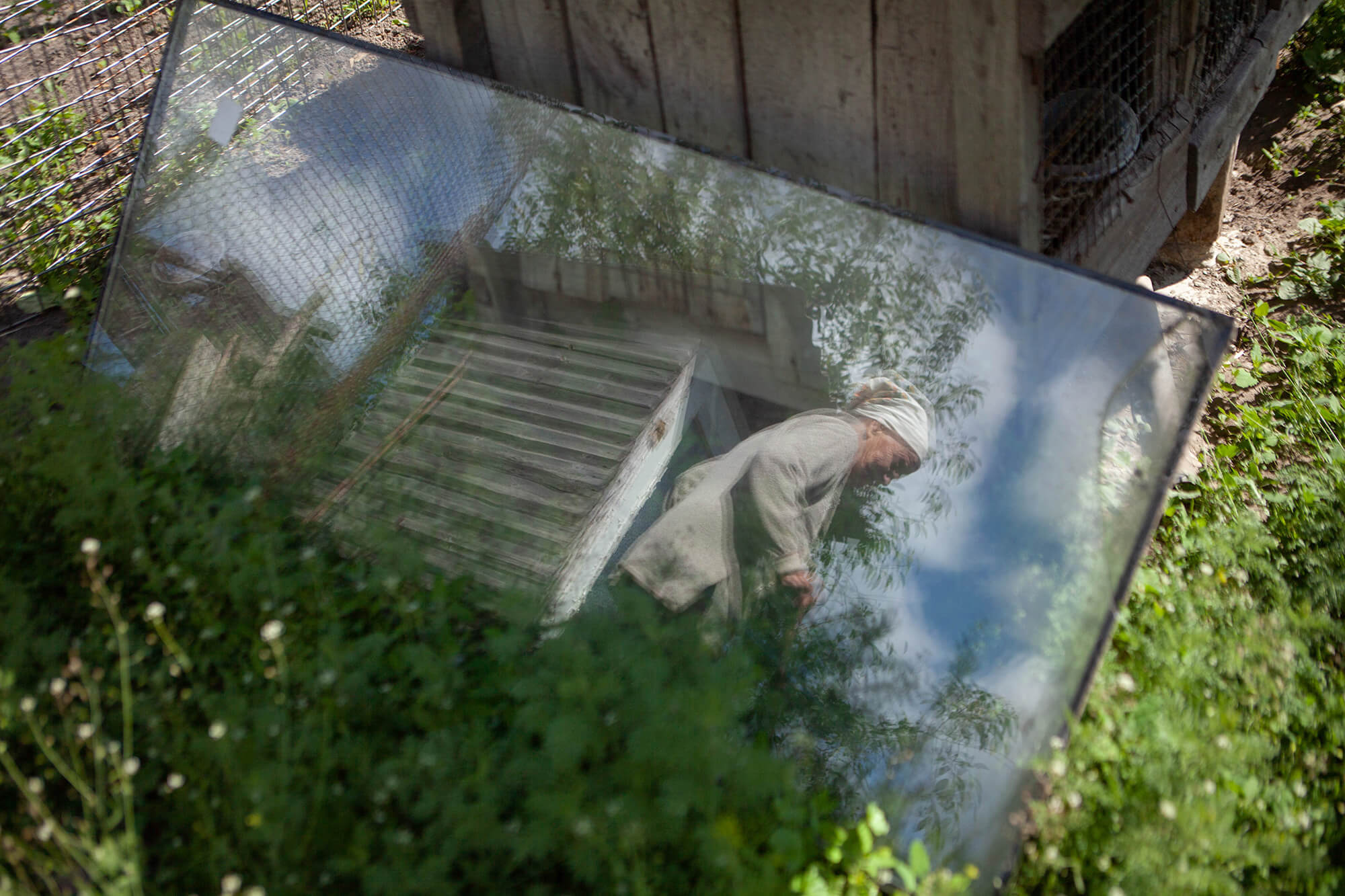
So the people went across the field to Anysiv with their backpacks, dogs, and children. They did not go together in a group, but each separately — no more than forty people in all. Many did not make it to the village when the shelling started along their route. A shell fragment hit a seventeen-year-old budding musician, Anna, in the stomach. Twenty-year-old student Serhiy did not make it home, either. Neither did the thirteen-year-old Sashko. In total, seven lives were cut short.
Liubov made it home, and when her son’s godmother came running, worried about her, she only said bluntly that, apparently, her time to die had not yet come.
Liubov’s thin thread
Liubov herself suggested to the farm director that she could come and milk the cows if no one else was around to do it.
«Not because of the money. But just because the animals were not being milked and were crying and the calves were hungry,» she recalls.
After all, twenty-four years ago, Liubov was a milkmaid, and a really good one, as she later told the doctor in the ambulance when he asked her to keep talking. She told him how she won the district and then regional competitions and how when she was running late for the all-Ukrainian competition, she took the first cab she saw, making it at the last moment, finishing third.
In the late afternoon of March 21, Liubov rode her bicycle to the farm. Her son’s godmother arrived a little later. The women set everything up, milked the cows, and measured the milk. They milked one hundred liters. After washing her hands, Liubov got on her bicycle. At her age, she has problems with hearing and didn’t hear the rumble of the shelling nor felt any pain.
«I just turned around and saw black smoke coming out of the shed. I tried to stand up, turning my head left and right, sort of as a self-check. Was everything all right? I could move one leg but not the other. I began to call for help. Kolia, a man who had come to help his wife, came running to me. All he said was, “Oh, Myronivna!” He took off his belt and tied it around my leg.»
Liubov did not ooh and aah. She felt her head with her hand and pulled off a once-bright headscarf. From the corner of her eye, she could see that something terrible had happened, but it did not hurt.
«There was only blood flowing,» she says.
The Russian plane had dropped bombs on the farm. Liubov was hit by a shard of one of them.
When the ambulance came, they decided to take her to Kulykivka via the same escape route. Kulykivka was quiet, and every effort was taken to evacuate the wounded out of Chernihiv.
In the ambulance, the doctor kept telling Liubov, «Go on, keep talking, don’t stop!» «What should I talk about?» Liubov wondered. Well, she used to be a milkmaid. That’s how she got her nickname.Everyone who tried to save her would later call her that.
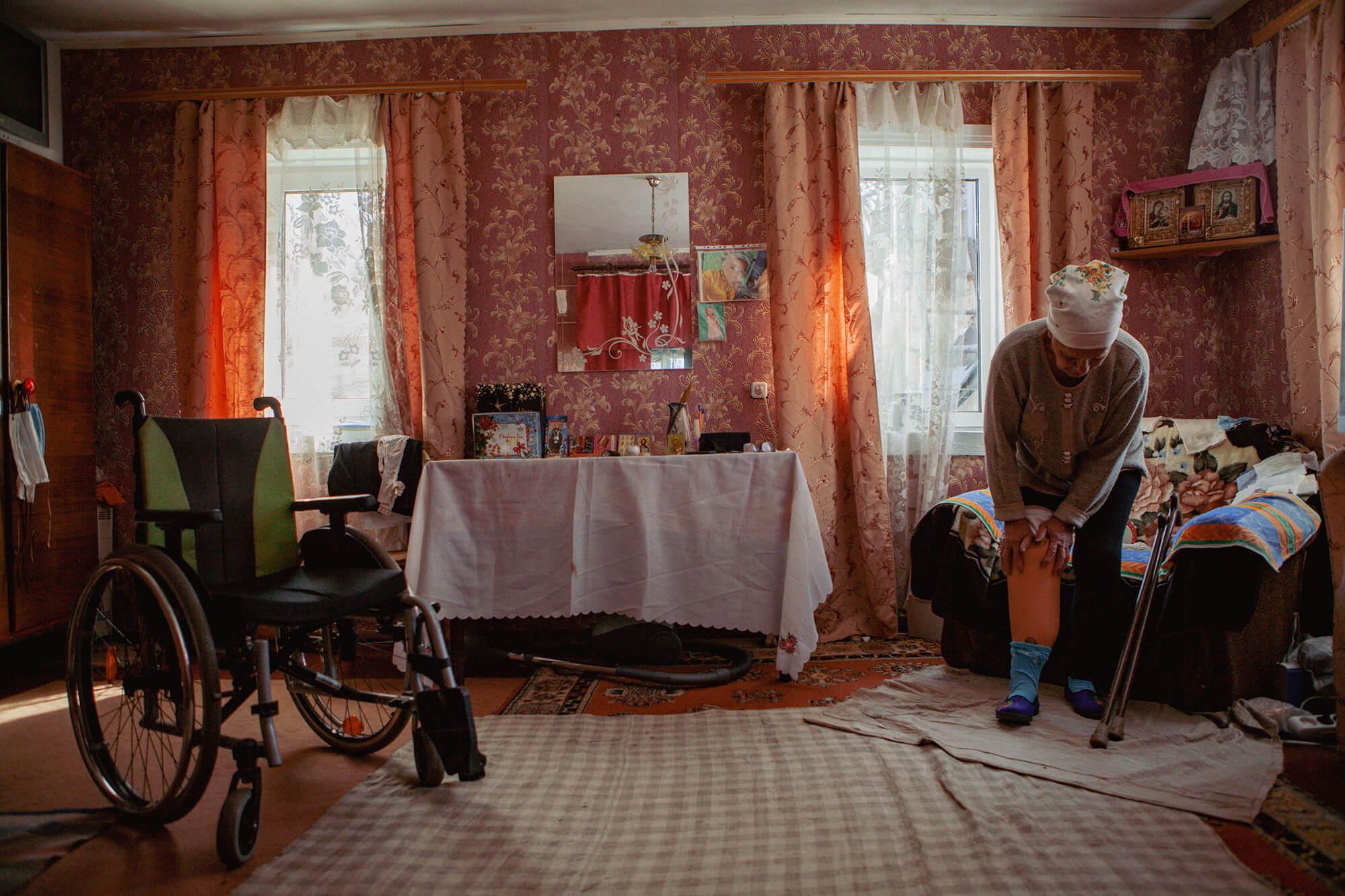
In Kulykivka, they placed her on the operating table, and another doctor asked her the same thing — come on, tell us something. Liubov was annoyed. Why did they keep pushing her to tell them something? What could she tell them anyway? About how she danced as a young woman, or what?
She could hardly restrain herself from teaching the nurse how to properly remove pus while dressing her wound. Take an egg yolk and a spoonful of honey, mix it, add some flour, and smear it on the wound— that will draw out the pus. That’s how her grandmother used to do it. They asked her to tell them something, but they never listened to her advice.
Liubov’s wish
On the eleventh day in Kulykivka hospital, a man entered her ward, tall, tan, bearded. “Who is this handsome man looking for?” Liubov wondered.
«I will take you to Kyiv,» the man said. «There are good doctors there. We’ll get you back on your feet, and you’ll be able to dance again, you’ll see.».
Liubov Myronivna burst out laughing. «To Kyiv?! Where will I stay? You’ll move a granny from the village into an apartment?». «I have a house near Kyiv. You can stay there». «Well, I won’t say no to a handsome man like you. Take me there if you want».
It was Slavka — Viacheslav Zaporozhets, a developer from Kyiv. In March, he and his friends and colleagues began bringing the wounded from Chernihiv and nearby towns like Kulykivka to Kyiv and paying for their medical care. In one of the interviews, Viacheslav said he had a profound fascination withBuddhism and was a bodhisattva who was supposed to help people. Liubov had never heard these terms before. To her, this man was simply Slavka, and she loved him dearly. It seemed so strange to her that he, a young man, took it upon himself to gether, a grannie, back onher feet.
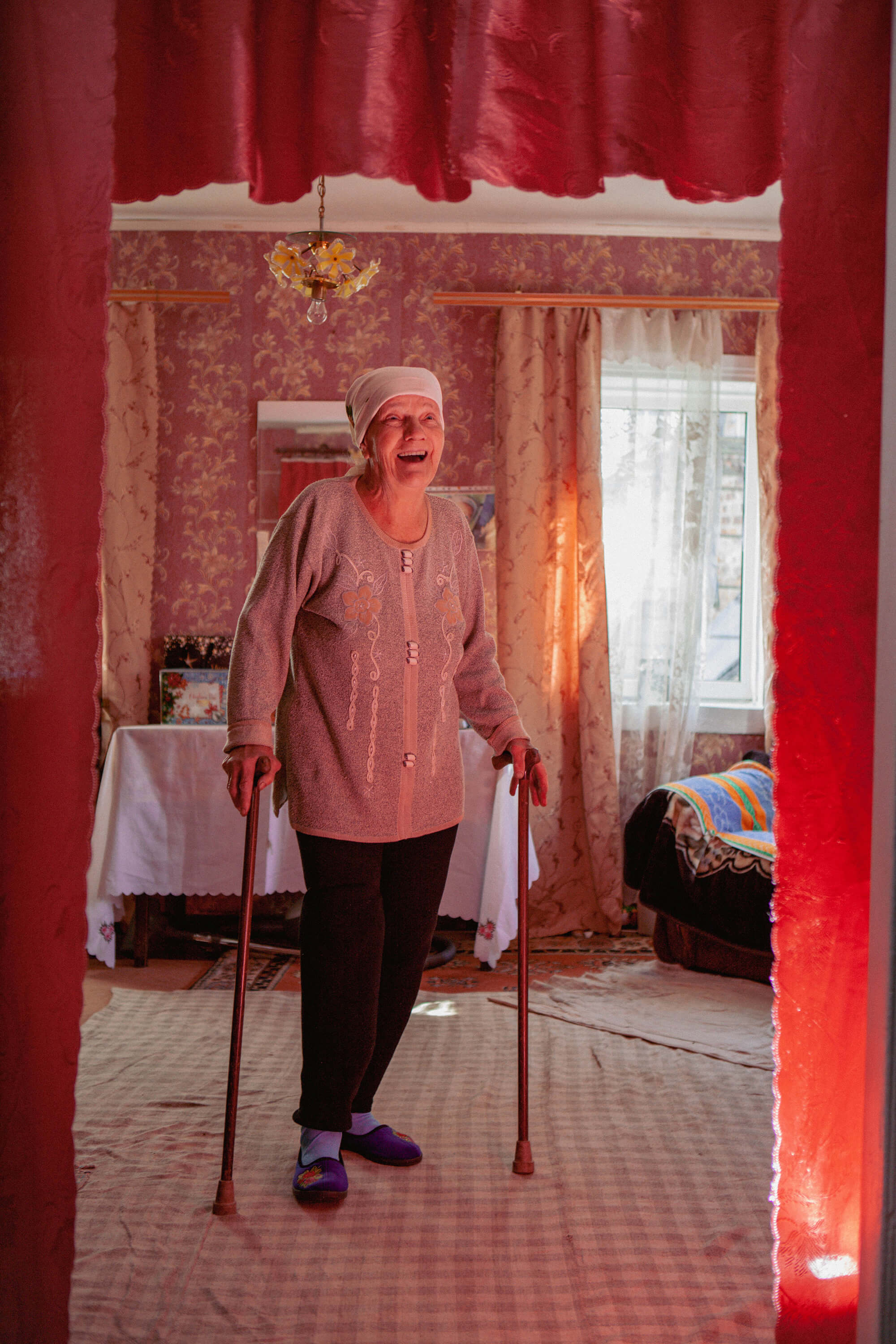
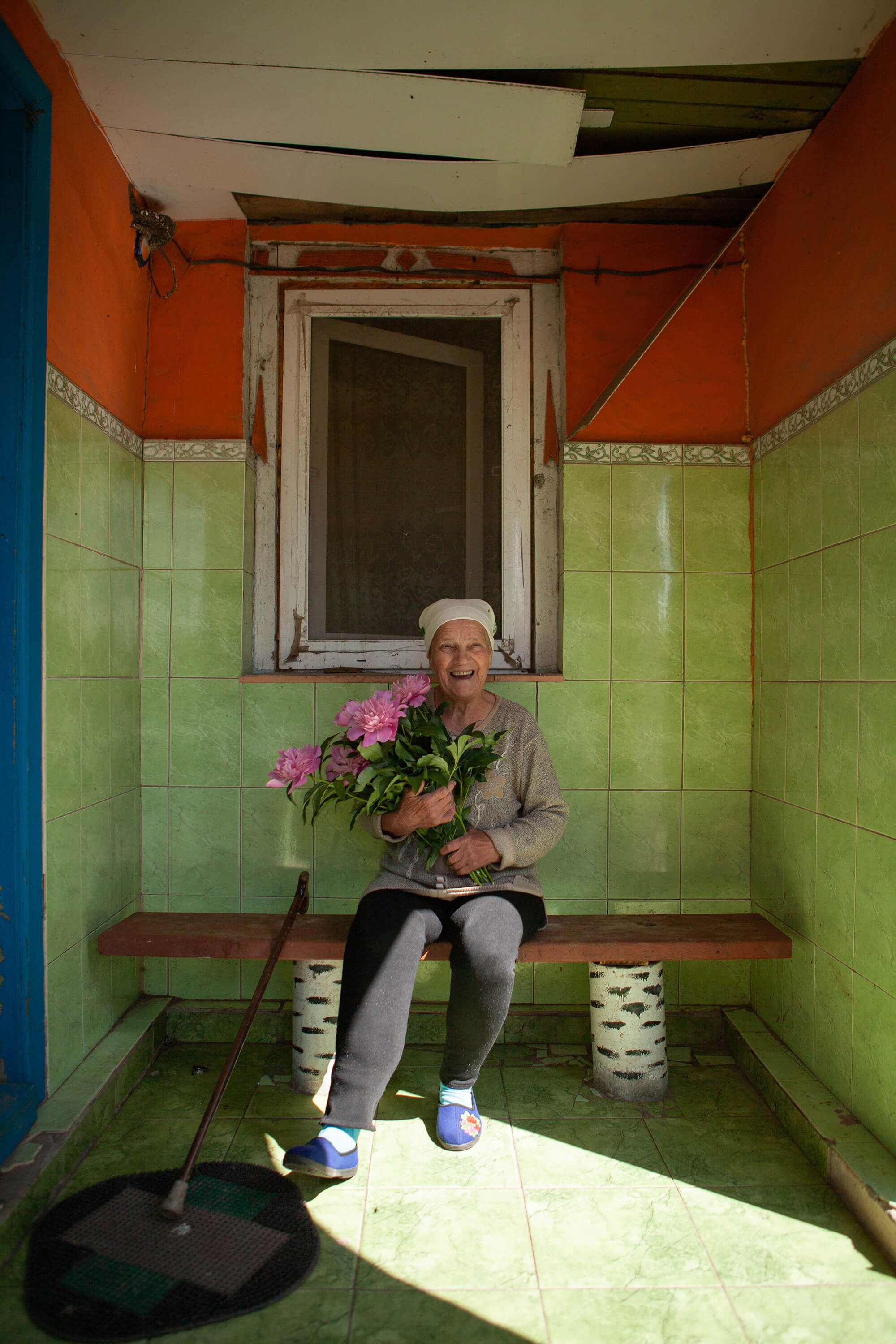
In Kyiv, Liubov had her leg amputated up to the knee. When she was in bed, nurses came to her and helped her with physical exercises so that she would not get sore and breathing exercises to avoid damaging her lungs. Once, she caught herself taking the hand of a young nurse.
«You just have to grant me one wish, young man,» she said.
«Which one?»
«I have to dance with you».
He helped her stand up. She put her healthy leg on the floor, and on the other leg, she had a peg, like pirates in a movie. They began to move slowly. Liubov imagined that they were waltzing. But it was painful and tough. The dance was a struggle.
«Well, Slavka, if you want me to dance, I will dance,» Liubov thought, looking at her pirate’s stump. “I will not disappoint you. I will do as you wish. You will be proud of me».
Liubov’s dance
Slavka carried the old woman in his arms and found prosthetic care for her in Austria. She did not want him to call her by her full name and patronymic, Liubov Myronivna.
«Liubov Myronivna…».
«Come on, Slavka, what did I tell you to call me?».
«Grandma».
…The Austrian doctors admired ‘Grandma’ even though she did not understand what they were saying and only communicated with thumbs up and thumbs down. She called a doctor of Indian origin ‘a Gypsy kid’t. At the same time, she was used as an example for everyone who could not come to terms with having a prosthesis. She had enough energy for the whole hospital.
Liubov was persistent, even if they demanded less of her than of younger people. She asked them not to coddle her.
«I didn’t do it for anyone. I was testing myself. Will I be able to move around the house? And uphill to visit my friend?»
That was her routine: the therapist would push the wheelchair, and Liubov would walk next to him. He’d ask her to sit down, but Liubov would just shake her head and give him a thumbs-up. The therapist would only roll his eyes.
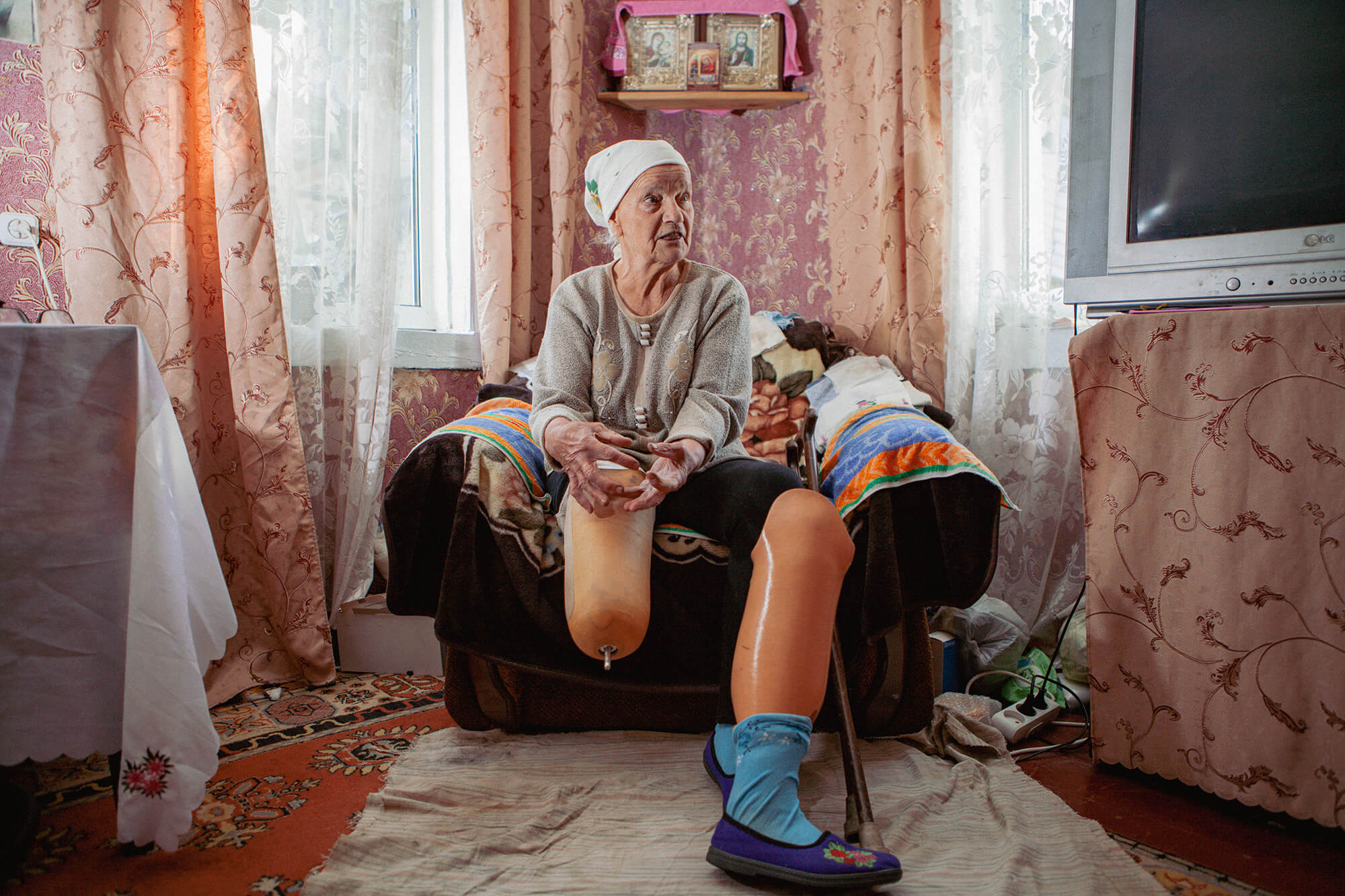
There was a large exercise area at the rehabilitation center. The day came when she was supposed to walk uphill for the first time with her prosthetic leg. The therapist asked: «Are you afraid?»
«No,» said Liubov, and scrambled up the hill. Others stopped halfway, but Liubov kept going until they had to stop her. On the dirt road, she was ahead of everyone else.
«Others said they could not do it anymore. But I never said, ‘I wouldn’t go, I wouldn’t do it.’ I always did what I was supposed to do. That’s what living in the village does to you. There was a woman my age at the rehabilitation center—we were supposed to lift the wooden bar fifteen times. So I did that for both of us. The doctor just yelled, ‘Enough! Enough!’»
Another time they were supposed to do rollovers. It was the first time Liubov got embarrassed. Wasn’t she too old for this? She pointed at herself and asked the therapist:
«Ya?», which means ‘I’ in Ukrainian.
«Ja-ja,» he said, which means ‘yes’ in German.
Another morning she came to her next lesson and saw a floor with square tiles resembling a checkerboard. She was told to move quickly from one tile to the next. Liubov stood there for a while until she decided it was time. She straightened her shoulders and began to dance, squatting. She danced across the square tiles because she made a promise. And just before being discharged, she danced the hopak on her prosthetic leg for the doctors.
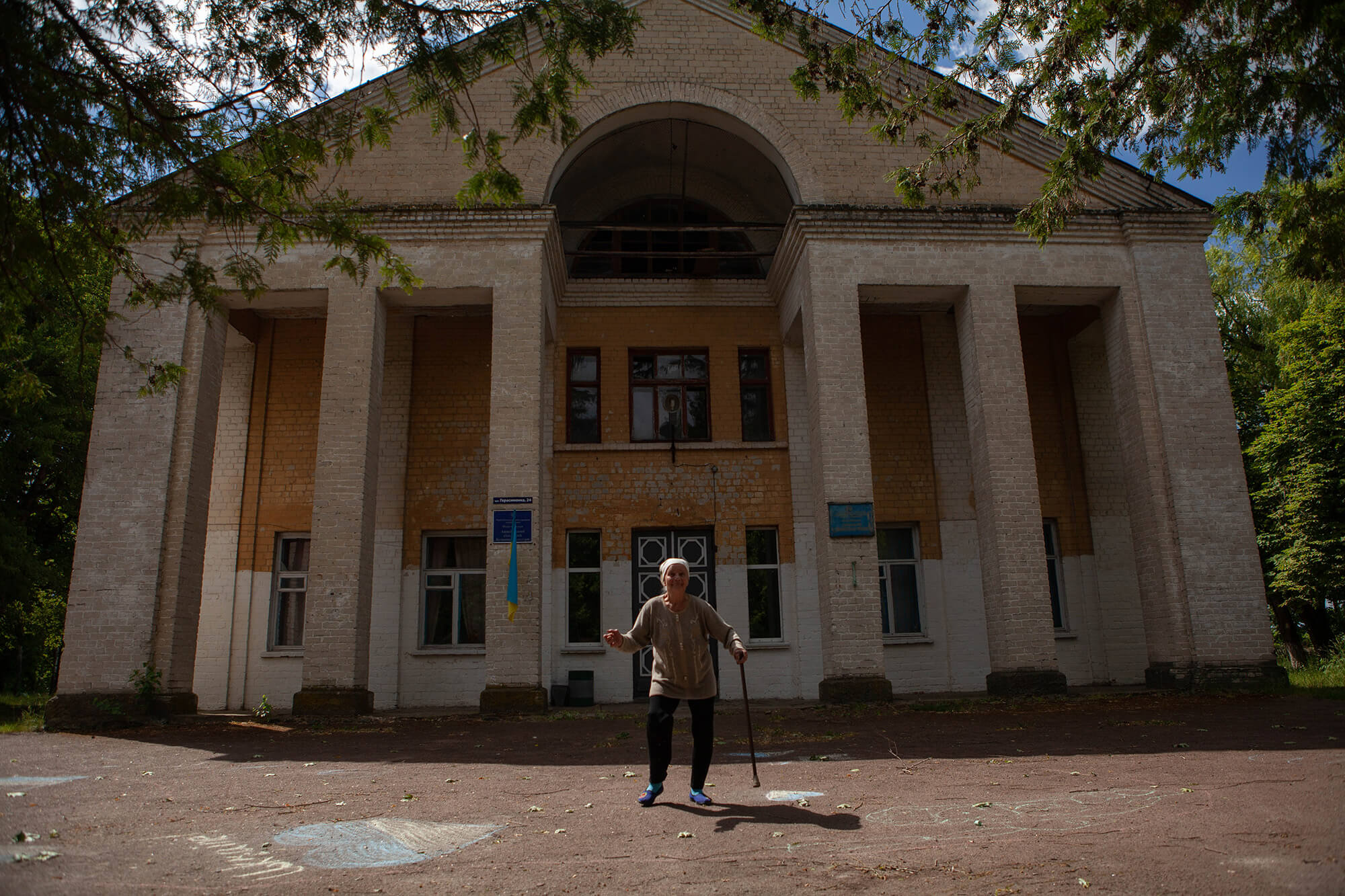
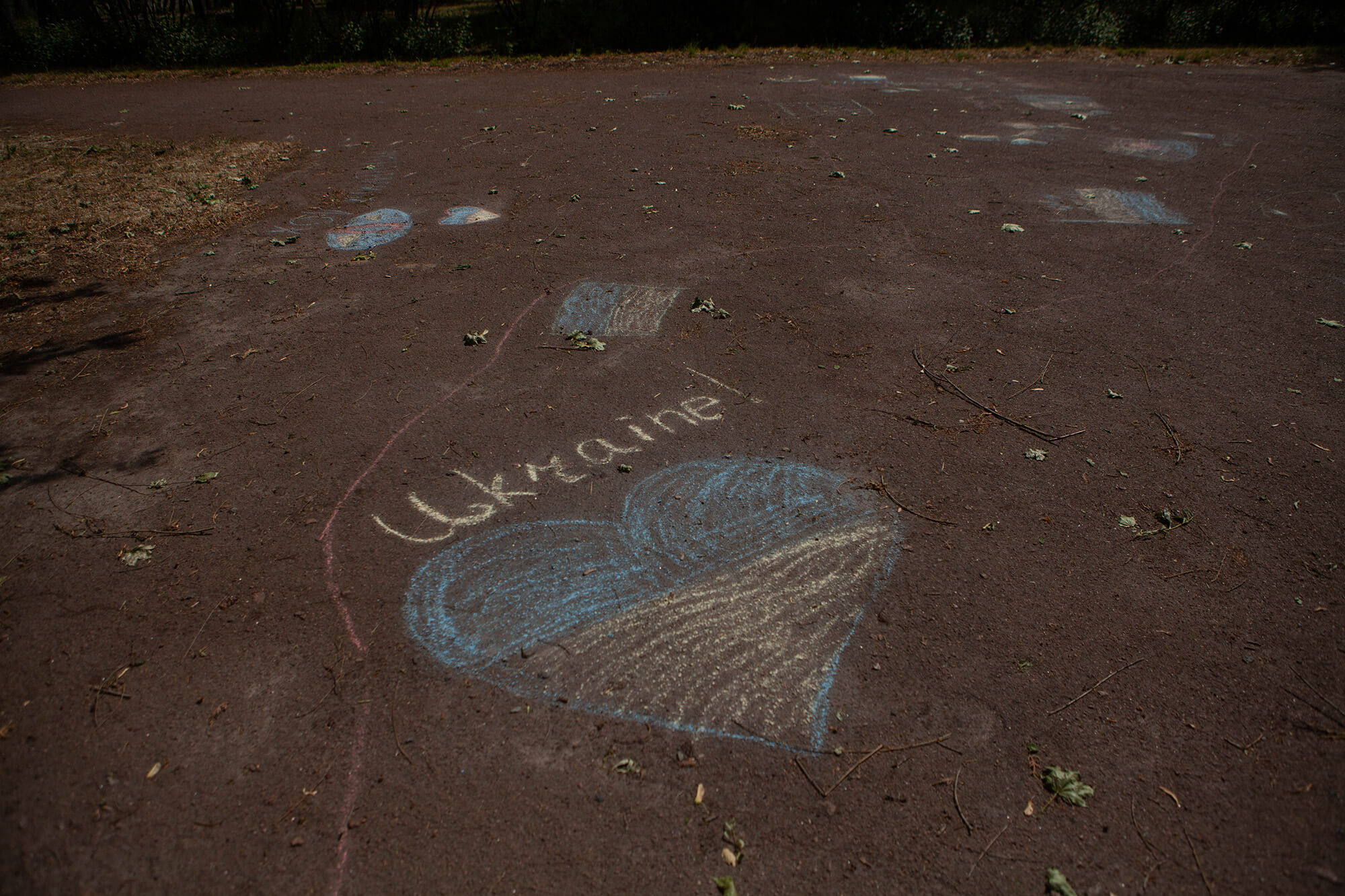
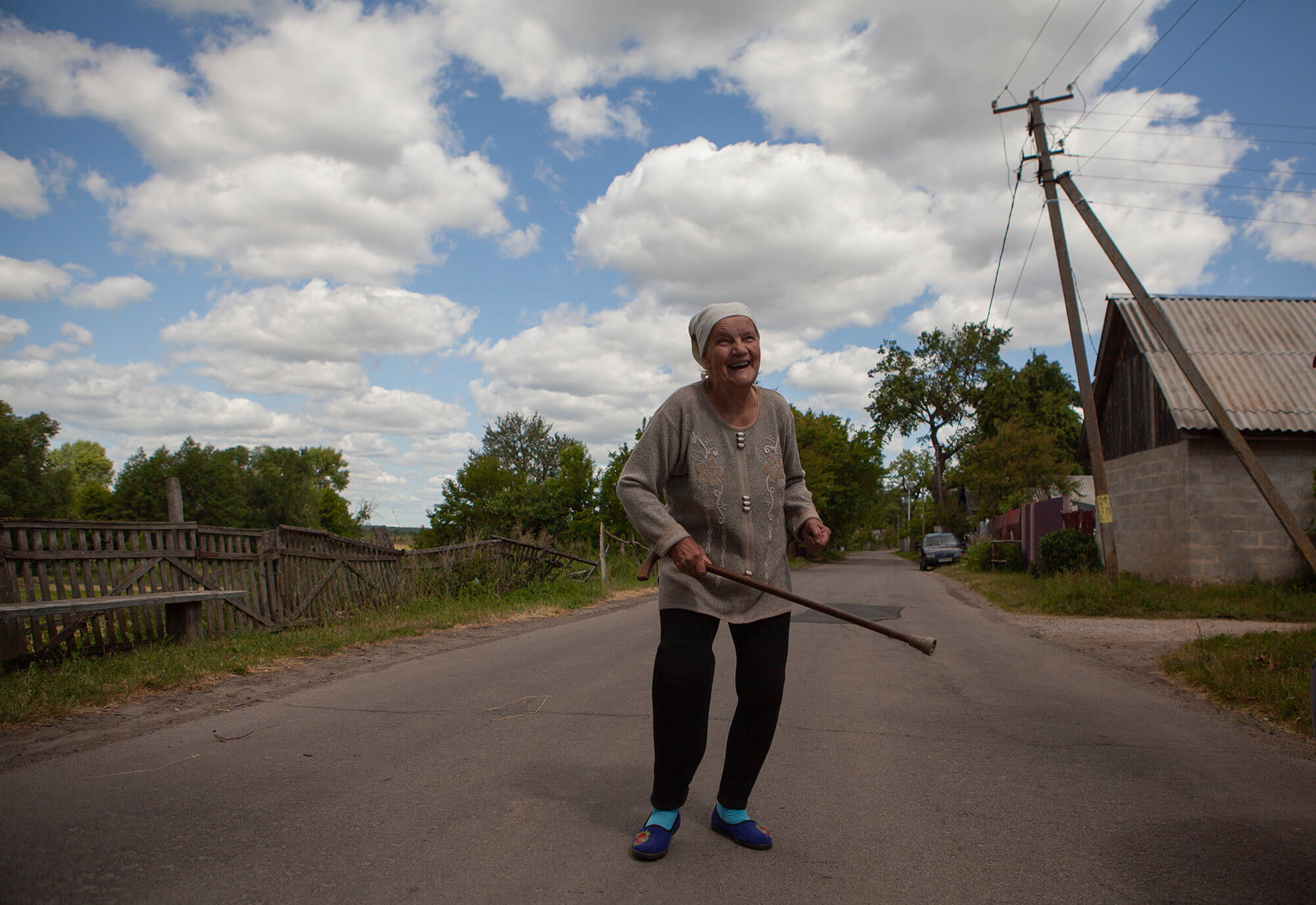
When she returned to Anysiv from Austria, she saw that her fence had been damaged, the windows had been shattered, and the chickens and rabbits had left, each going their own way. Liubov started everything from scratch. She single-handedly planted 0.15 hectares of potatoes and now weeds her garden early in the morning when the sun is still low. Every time she loads up Slavka and his friends with pickles, beans, and potatoes, even though Slavka has his own business and a house with a swimming pool. What he does not have, though, are potatoes like hers that grow in good soil.
«Shh, just take it!» she says.
And sometimes she dances at home all by herself — simply because she can. She hadn’t danced for two years since her son died. She did not want to dance at all anymore. But now Slavka, who has grown close to her heart, visits her often. And she promised him that she would dance, didn’t she? How else could she thank him other than with dried apples and pears, potatoes, and pickles — but with a dance?
Liubov’s home village Anysiv is also getting back on its feet — just like her.
***
«Healed Lands. Зцілені землі» is part of «De-occupied: Stories of the Liberated Territories», a project supported by the Heinrich Böll Foundation’s Bureau in Kyiv. Its goal is to show that Ukrainians are not giving up or waiting for outside help but are bringing life back to their communities and homes. Even though the war is still raging.
In these texts, we report on the renewal of life in Ukrainian territories that used to be temporarily occupied or sieged by the Russian army. We publish stories based on personal experiences of war — about people who find the strength to go on living and pass that strength on to others. About people who lead by example, inspire others, andhelp villages and towns recover from war through their initiatives.
Have read to the end! What's next?
Next is a small request.
Building media in Ukraine is not an easy task. It requires special experience, knowledge and special resources. Literary reportage is also one of the most expensive genres of journalism. That's why we need your support.
We have no investors or "friendly politicians" - we’ve always been independent. The only dependence we would like to have is dependence on educated and caring readers. We invite you to support us on Patreon, so we could create more valuable things with your help.
Reports130
More






